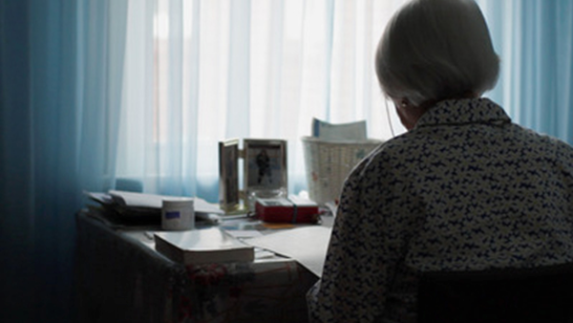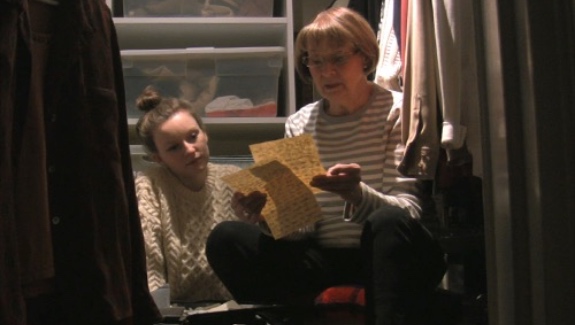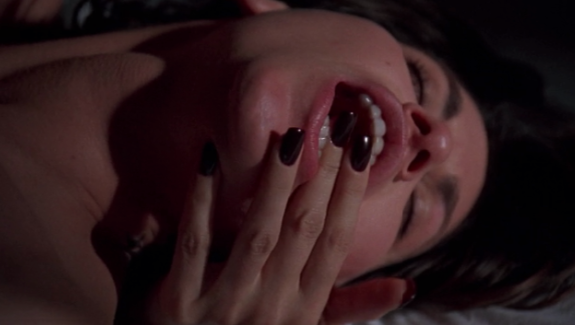
Firsts are often thought to belong to the young: first steps, first word, first day of school, first kiss, first heartbreak. In this way, firsts are synonymous with novelty, momentous events that become less and less frequent—or at least less publicly lauded—as time passes. It’s a logic that emphasizes youth and calcifies the assumption that as we age, we cease to experience wonder, surprise or adventure. The films of Sofia Bohdanowicz subvert the dominant logic: focusing on the lives of elderly matriarchs, the filmmaker challenges such conventional thinking and makes the case for never-ending novelty despite our years.
Older women have largely proven to be an impossibility of the imagination on screen. Battling both sexism and ageism, the demographic faces a doubled erasure as though their inner lives cease to exist once past the years of the doe-eyed ingénue, the love interest or the doting wife and mother. Bodhanowicz undermines this trope by turning to the matriarchs in her own life, her paternal and maternal grandmothers, and in doing so paints complex portraits of women who continue to live long after mainstream culture ceases to showcase them.
Take Bohdanowicz’s second short, Dundas Street (2012), co-directed with Joanna Durkalec, which follows an older immigrant as she attempts to forge connections in her new urban landscape. The short is a city symphony, but one in a minor key: the film eschews any representations of the bright lights and the big city in favour of the quotidian, a thematic to which Bohdanowicz continually returns. The use of poetry adds another layer of complexity, read in voiceover and taken from the work of Bohdanowicz’s paternal great grandmother, Zofia. (Bohdanowicz blurs the boundaries of the visual medium and the written word in other shorts like 2016’s A Drownfull Brillance of Wings, based on Gillian Sze’s poem “Arriving.”) The texture of Dundas Street is then intimate on both fictional and personal levels as Bohdanowicz engages as both an artist and as great-granddaughter with this matriarch.

In her Last Poems trilogy (2014), Bohdanowicz continues to explore and challenge both gendered and genre expectations. The series, which includes Modlitwa (A Prayer), Wieczór (An Evening) and Dalsza Modlitwa (Another Prayer), is centred on Bohdanowicz’s late paternal grandmother: filmed before and immediately following her passing, the three shorts form a powerful trilogy on love, mourning and life after death. Modlitwa (A Prayer) follows Bohdanowicz’s grandmother as she goes about her day, cleaning, eating, talking on the phone—radical alone for its compassionate look at the lives of the elderly, which are too often considered over long before the body and mind cease to function. This short, in the vein of Chantal Akerman (an increasingly often-cited reference when considering Bohdanowicz’s work), challenges what constitutes a “great story” by teasing out deep meaning in the everyday. Rather than defaulting to the trappings of the epic, which position bravery as being analogous with the scale of the story, Modlitwa (A Prayer) finds resonance in the simple acts of living, suggesting that to live, in and of itself, is a heroic act.

Wieczór (An Evening) and Dalsza Modlitwa (Another Prayer), filmed after the passing of Bohdanowicz’s grandmother, capture both a sense of legacy and longing. In Wieczór (An Evening), Bohdanowicz’s camera films the now-empty house as a record scratches and plays over images of the dark rooms at dusk. In Dalsza Modlitwa (Another Prayer), Bohdanowicz projects images from Modlitwa (A Prayer) on the walls and spaces of her grandmother’s home, a poignant but pointless plea to bring the dead back to life. The tender procedural makes the domestic space ring with a hallowed tone; it evolves beyond the private sphere, becoming the site of memorial and commemoration.

In her first feature, Never Eat Alone (2016), which won Best Emerging Canadian Director at the Vancouver Film Festival, Bohdanowicz continues to work with the stories of the older women in her life, here her maternal grandmother, Joan Benac. A docu-fiction (again, that play with genre), Bohdanowicz uses archival material from a television production filmed at Toronto’s Casa Loma in the 1950s featuring a young Benac with footage of the older tour de force in the present day. Benac’s granddaughter (a loose Bohdanowicz stand-in played by cléo contributor and rising star Deragh Campbell) tries to help the now-widowed Benac find a long-lost love (the grandfather of Bohdanowicz’s producer and partner, Calvin Thomas, steps into this role).
Firsts, in Bohdanowicz’s films, as in life, aren’t a finite resource.
Filmed on an HV20 Camcorder, Never Eat Alone has a harsher, more lo-fi feel than Bohdanowicz’s previous shorts. But the style matches the narrative, which is also barebones and even at times uncomfortable in its honest, head-on examination of the fears of dying (to say nothing of just eating) alone. Crucially, with Benac at the centre, once again Bohdanowicz demonstrates that the lives of women don’t cease after reaching “a certain age.” Firsts, in Bohdanowicz’s films, as in life, aren’t a finite resource. They continue to unspool in abundance until our last moment—that final first.





